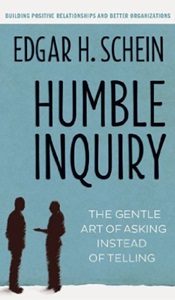"Here-and-Now" Humility
Review of 'Humble Inquiry' by Edgar H. Schein

Humble Inquiry by Edgar Schein is a must-read for any leader who wants to understand how to move their influence to the next level and draw the very best out of their team — but it is not a book about technique or skill development.
This is a book about character and heart, and if you are insecure in your leadership, it will call you out. If you need to be first, seek the limelight, or if you have to always have the answer because you’re the leader, it will reveal weaknesses.
Humble Inquiry teaches the leader how to build trust in his or her team through asking questions, but more so through humility. Schein challenges the leader to be the first to become vulnerable, setting the culture of the team through authenticity and transparency.
He challenges the status quo of building trusting relationships over task accomplishment and shows that more is accomplished when a leader takes time to build trust in the team. This trust-building process must be initiated and monitored by the leader, and serves as the health indicator of the team.
People matter more than projects, but our culture teaches us the opposite.
Schein argues there are three kinds of humility the leader can avail themselves of:
Basic humility — This is based on traditional status as ascribed by birth or social position where humility is not a choice, but a condition.
Optional humility — Where status is achieved by accomplishments, we feel humble in the presence of people who have achieved much.
Here-and-now Humility — This humility is crucial for understanding of Humble Inquiry. “Here-and-now Humility” is a feeling of dependence on someone who knows more than me, regardless of status.
This kind of humility is difficult to learn because in achievement-oriented cultures where knowledge is admired, being “here-and-now humble” implies loss of status. Yet this is precisely the kind of humility that will increasingly be needed by leaders, managers and professionals of all sorts.
For example, a leader of a multicultural team who wants to ensure open, task-related communication would use Humble Inquiry to build relationships that would make them feel emotionally safe and able to overcome any conflict they may experience, regardless of a sense deference.
Humble inquiry is the art of drawing someone out, of asking questions and building a relationship based on curiosity and genuine interest in the other person. Accessing your ignorance, or allowing curiosity to lead you, is often the best guide to what to ask about.
Here’s the problem addressed by Humble Inquiry: The world is becoming more technologically complex, interdependent and culturally diverse, which makes the building of relationships more and more necessary to get things accomplished and, at the same time, more difficult. Relationships are the key to good communication; good communication is the key to successful task accomplishment; and Humble Inquiry, based on “Here-and-now Humility”, is the key to good relationships.
Bottom line: People matter more than projects, but our culture teaches us the opposite. Humble Inquiry helps us learn a new way that is both effective at accomplishing projects and builds people in the process. Sounds like something Jesus would do to me.
Influence Magazine & The Healthy Church Network
© 2025 Assemblies of God

